
"Crazy Little Thing Called Love" is a song by the British rock band Queen. Written by Freddie Mercury in 1979, the track is included on their 1980 album The Game, and also appears on the band's compilation album Greatest Hits in 1981. The song peaked at number two in the UK Singles Chart in 1979, becoming the group's first number-one single on the Billboard Hot 100 in the US in 1980, remaining there for four consecutive weeks. It topped the Australian ARIA Charts for seven weeks. It was the band's final single release of the 1970s.

Derek and the Dominos was an English–American blues-rock band formed in the spring of 1970 by guitarist and singer Eric Clapton, keyboardist and singer Bobby Whitlock, bassist Carl Radle and drummer Jim Gordon. All four members had previously played together in Delaney & Bonnie and Friends, during and after Clapton's brief tenure with Blind Faith. Dave Mason supplied additional lead guitar on early studio sessions and played at their first live gig. Another participant at their first session as a band was George Harrison, the recording for whose album All Things Must Pass marked the formation of Derek and the Dominos.

"Layla" is a song written by Eric Clapton and Jim Gordon, originally recorded by Derek and the Dominos, as the thirteenth track from their only studio album, Layla and Other Assorted Love Songs (1970). Its contrasting movements were composed separately by Clapton and Gordon. The piano part has also been controversially credited to Rita Coolidge, Gordon's girlfriend at the time.

"Love You Inside Out" is a 1979 hit single by the Bee Gees from their album, Spirits Having Flown. It reached number one on the Billboard Hot 100 for one week in June 1979, interrupting Donna Summer's "Hot Stuff", becoming the third single from the album to do so. In the UK, the single peaked at No. 13 for two weeks. It was the ninth and final number-one hit for the Bee Gees in the US, and the eleventh and final number-one hit in Canada as well. The trio would not return to the top 10 for ten years, with the song, "One".
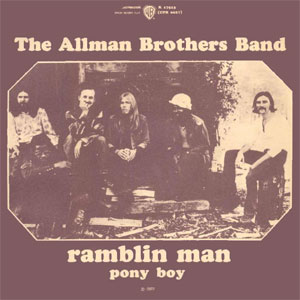
"Ramblin' Man" is a song by American rock band The Allman Brothers Band, released in August 1973 as the lead single from the group's fourth studio album, Brothers and Sisters (1973). Written and sung by guitarist Dickey Betts, the song was inspired by a 1951 song of the same name by Hank Williams. It is considerably more inspired by country music than other Allman Brothers Band compositions, which made the group reluctant to record it. Guitarist Les Dudek provides guitar harmonies, and it was one of bassist Berry Oakley's last contributions to the band.

"Fat Bottomed Girls" is a song by the British rock band Queen. Written by guitarist Brian May, the track featured on their 1978 album Jazz and later on their compilation album Greatest Hits. When released as a single with "Bicycle Race", the song reached number 11 in the UK Singles Chart and number 24 in the Billboard Hot 100 in the US.
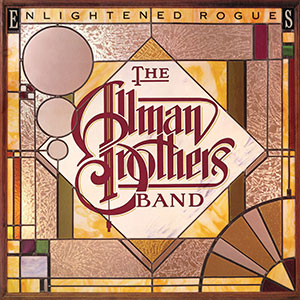
Enlightened Rogues is the sixth studio album by American rock band the Allman Brothers Band. Produced by Tom Dowd, the album was released in February 1979 in the United States by Capricorn Records and PolyGram Records elsewhere. The Allman Brothers Band had broken up in 1976 following internal turmoil, amplified by escalating drug use. The band members splintered into different acts — among those Great Southern, Sea Level, and the Gregg Allman Band. Guitarist Dickey Betts approached his bandmates in 1978 with the prospects of a reunion. After two former members declined to return, they added new members which made it the first to feature guitarist Dan Toler and bassist David Goldflies. Living together in Sarasota, Florida, they rehearsed and wrote the material for their next album in fall 1978.

"Let's Go" is a song by American rock band the Cars, written by Ric Ocasek for the band's second studio album, Candy-O (1979). A new wave rock song, the song's hook was inspired by the Routers. The song's vocals are performed by bassist Benjamin Orr.

"How Long" is the debut single by the English band Ace, from their 1974 debut album Five-A-Side. It reached No. 3 in the US and Canadian charts, and No. 20 on the UK Singles Chart.

"What a Fool Believes" is a song written by Michael McDonald and Kenny Loggins. The best-known version was recorded by the Doobie Brothers for their 1978 album Minute by Minute. Debuting at number 73 on January 20, 1979, the single reached number one on the Billboard Hot 100 on April 14, 1979, for one week. The song received Grammy Awards in 1980 for both Song of the Year and Record of the Year.

"Take It to the Limit" is a song by the Eagles from their fourth album One of These Nights from which it was issued as the third single on November 15, 1975. It reached No. 4 on the U.S. Billboard Hot 100 and was also the Eagles' greatest success to that point in the UK, going to No. 12 on the charts. Billboard ranked it as the No. 25 song for 1976.

"It's Gonna Work Out Fine" is a song written by Rose Marie McCoy and Joe Seneca. It was originally released by R&B duo Ike & Tina Turner in 1961 as a single from their album Dynamite! (1962). The record is noted for being their first Grammy nominated song and their second million-selling single after "A Fool In Love".

"Midnight Rider" is a song by the American rock band the Allman Brothers Band. It was the second single from their second studio album, Idlewild South (1970), released on Capricorn Records. The song was primarily written by vocalist Gregg Allman, who first began composing it at a rented cabin outside Macon, Georgia. He enlisted the help of roadie Robert Kim Payne to complete the song's lyrics. He and Payne broke into Capricorn Sound Studios to complete a demo of the song.
"I'm No Angel" is a rock song written by Tony Colton and Phil Palmer, and first recorded by Bill Medley of The Righteous Brothers on his 1982 solo album Right Here and Now. It gained greater fame when it was covered by American Southern rock band the Gregg Allman Band as the title track and lead single of their 1987 album I'm No Angel, released on Epic Records. The song was an unexpected hit, gaining heavy album-oriented rock airplay and reaching number one on Billboard's Album Rock Tracks chart.

"Run to Me" is a song by the Bee Gees, the lead single and first track on the group's album To Whom It May Concern (1972). The song reached the UK Top 10 and the US Top 20.
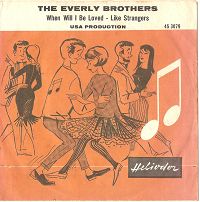
"When Will I Be Loved" is a popular song written by Phil Everly of the Everly Brothers, who had a US top-ten hit with it in 1960. Linda Ronstadt covered the song in 1975, and her version was an even bigger hit in the US, peaking at No. 2. Vince Gill also covered it in 1994 on the soundtrack of the film 8 Seconds.

"You Belong to Me" is a song written by American singer-songwriters Carly Simon and Michael McDonald. Originally recorded by McDonald's rock group The Doobie Brothers for their seventh studio album, Livin' on the Fault Line (1977), the song was made famous by Simon when she recorded it for her seventh studio album, Boys in the Trees (1978). A live version of the song from The Doobie Brothers' 1983 album Farewell Tour would later chart on the Pop Singles chart at No. 79 in August 1983.
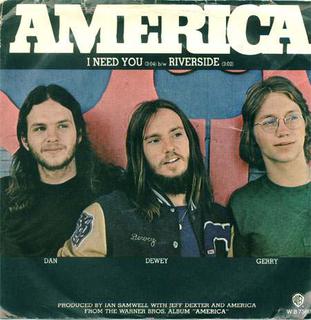
"I Need You," released in 1972, is the second single by the band America from their eponymous debut album America. The song was written by Gerry Beckley.

"Revival", sometimes listed as "Revival ", is a song by the American rock band the Allman Brothers Band. It was the lead single from their second studio album, Idlewild South (1970), released on Capricorn Records. The song was written by guitarist Dickey Betts, his first songwriting credit for the group.
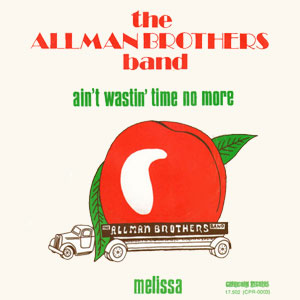
"Ain't Wastin' Time No More" is a song by the American rock band the Allman Brothers Band. It was the lead single from their third studio album, Eat a Peach (1972), released on Capricorn Records. The song, written by Gregg Allman, largely concerns the death of his brother, Duane Allman, who was killed in a motorcycle crash in 1971.



















